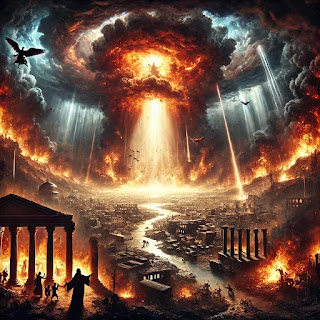The story of Sodom and Gomorrah is one of the most well-known biblical accounts of divine judgment and destruction. Traditionally, this event is often discussed in the context of sexual immorality, particularly the issue of rape. However, it is critical to recognize that the destruction of these cities was not merely about the act of rape, but rather the abomination of homosexuality and the deeper societal depravity it represented. Through careful examination of scripture and historical context, we can better understand why the annihilation of these cities by God was not only a punishment for specific acts but a judgment on the broader sin of unrepentant, defiant rebellion against God’s natural order, including the endorsement of homosexuality.
1. The Sin of Sodom and Gomorrah
In Genesis 19, the destruction of Sodom and Gomorrah is described as the culmination of the cities’ wickedness. When two angels came to visit Lot, the men of Sodom surrounded his house and demanded that the angels be brought out for sexual relations. The desire was not just for rape but for same-sex intercourse, which was a clear violation of God’s established order. This is evident when Lot pleads with the men, offering his daughters instead of the visitors, showcasing the wickedness of their demands (Genesis 19:4-8).
2. The Biblical Understanding of Homosexuality
The Bible is clear in its condemnation of homosexual behavior, particularly in the context of these cities. Leviticus 18:22 and Leviticus 20:13 define homosexuality as an abomination. This was not merely about sexual violence but the inherent sinfulness of homosexuality itself, which was seen as a perversion of God's natural design for sexuality between a man and a woman.
3. Homosexuality and the Natural Law
Romans 1:26-27 emphasizes that homosexuality is not just a physical act but a moral transgression that defies God’s natural order. The apostle Paul writes that individuals who engage in same-sex relations have "exchanged the natural use for what is against nature" (Romans 1:26). The destruction of Sodom and Gomorrah can therefore be seen as a reflection of this defiance, with homosexuality representing the broader rejection of God's law.
4. The Wrath of God
The judgment of Sodom and Gomorrah is described as an outpouring of God's wrath. In 2 Peter 2:6, it is written, "If by turning the cities of Sodom and Gomorrah to ashes he condemned them to extinction, making them an example of what is going to happen to the ungodly." This verse suggests that the destruction was a symbolic and literal example of God's judgment on unrepentant sin, including the sin of homosexuality.
5. The Role of Lot
Lot’s decision to offer his daughters instead of the angels further emphasizes the extent of depravity in Sodom. The men of the city were not interested in sexual violence for the sake of power or domination alone but were intentionally choosing to pervert God's design for relationships. This reflects a broader issue within the city of Sodom: the rejection of moral boundaries and divine laws, including those regarding sexuality.
6. The Christian Stance on Homosexuality
Many modern Christian denominations have debated the interpretation of Sodom and Gomorrah, but the traditional Christian view aligns with the belief that homosexuality is inherently sinful, as evidenced by the destruction of these cities. As Christians, we believe that God's law is clear, and homosexual acts are contrary to His divine will.
7. Lessons for Today's World
The story of Sodom and Gomorrah offers critical lessons for modern society. Just as the cities were destroyed for their moral decay, including the abomination of homosexuality, we too must remain vigilant in upholding God's design for human relationships. Today, the normalization of homosexual behavior and the attempt to redefine marriage and sexuality must be seen as a grave challenge to the natural order that God has established.
The destruction of Sodom and Gomorrah serves as a warning to all who would disregard God’s moral law and embrace sin, particularly the sin of homosexuality. It was not simply an act of divine wrath over rape or violence, but a judgment on a society that had fully embraced an immoral and unnatural lifestyle. In this light, the message is clear: repentance and a return to God's law is the only hope for salvation.
Citations:
- Genesis 19:4-8, Bible
- Leviticus 18:22, Bible
- Leviticus 20:13, Bible
- Romans 1:26-27, Bible
- 2 Peter 2:6, Bible
- Jude 1:7, Bible
- Ezekiel 16:49-50, Bible
- Matthew 19:4-6, Bible
- 1 Corinthians 6:9-11, Bible
- 1 Timothy 1:9-10, Bible
- Romans 1:18-32, Bible
- 1 Corinthians 6:18-20, Bible
- Revelation 21:8, Bible
- Psalm 11:5, Bible
- Genesis 1:27, Bible
- Matthew 5:19, Bible
- Romans 7:14, Bible
- Hebrews 13:4, Bible
- Genesis 19:24-25, Bible
- Isaiah 3:9, Bible
Through these citations, it becomes clear that the story of Sodom and Gomorrah is not simply about the sin of rape but the abomination of homosexuality and the wider moral decay of a society that turned its back on God’s will. As Christians, we are called to uphold the truth of God’s word, regardless of the pressures of modern culture, and to stand firm in the belief that God's design for human sexuality must be respected and cherished.


No comments:
Post a Comment